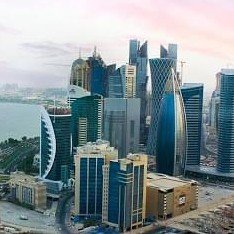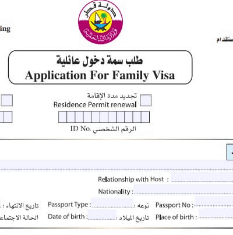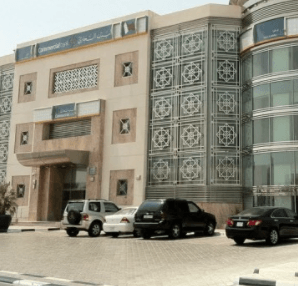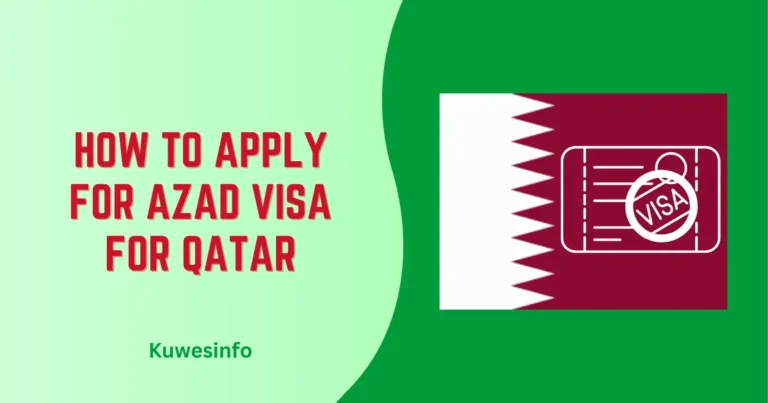Qatar | Exploring the Heart of the Arabian Gulf
Qatar, a small but mighty country located in the heart of the Middle East, is often overshadowed by its larger neighbors. But don’t let its size fool you – Qatar has a lot to offer. From its rich history and culture to its booming economy and modern infrastructure, there’s something for everyone to explore and enjoy.
In this blog post, we’ll take a closer look at Qatar – its geography, history, government, economy, and more. Whether you’re planning a trip to this fascinating country or simply want to learn more about it from the comfort of your own home, this informative guide will provide you with all the essential information you need. So sit back, relax, and let’s delve into the wonders of Qatar!
History
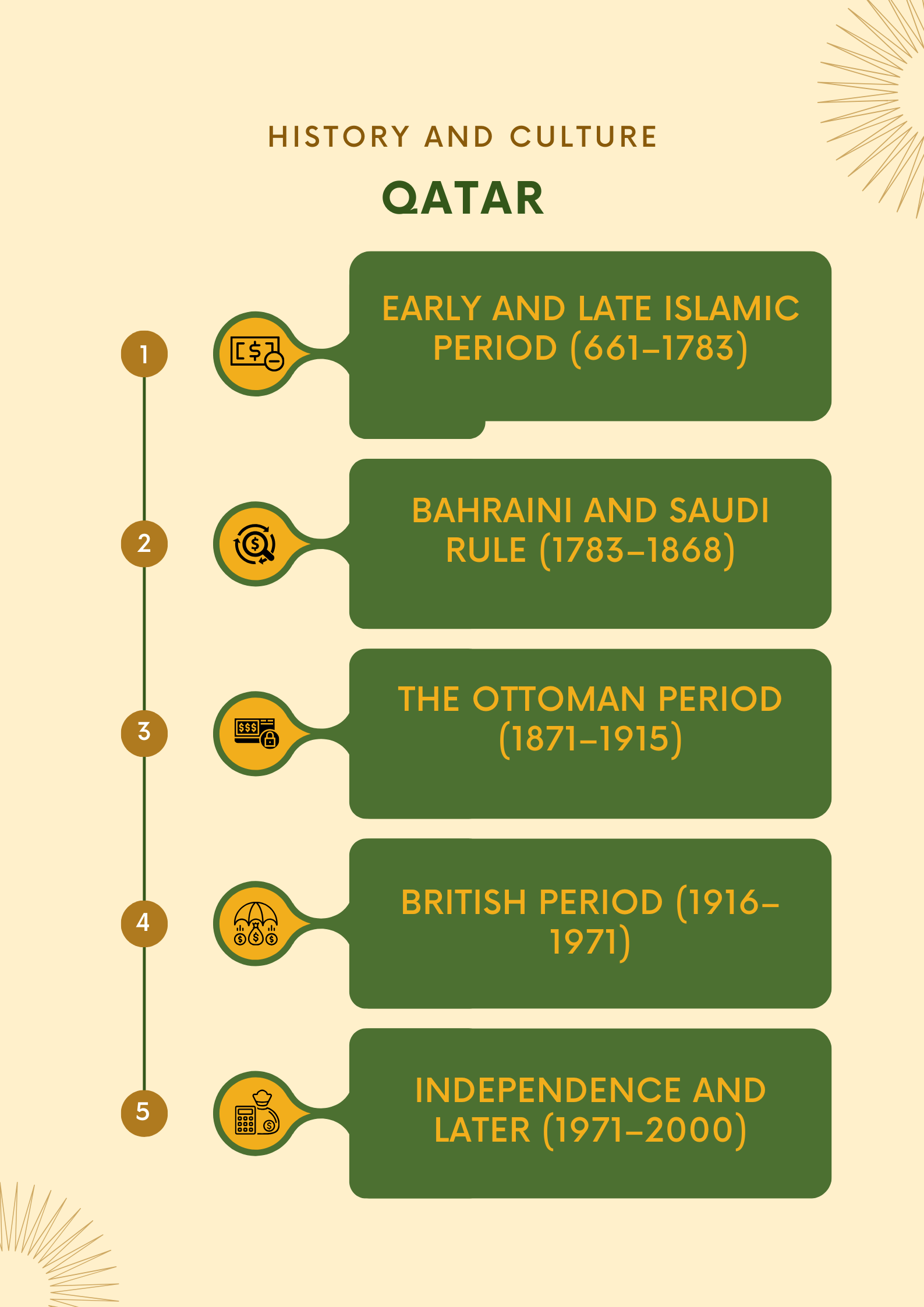
Qatar has a rich history and vibrant culture that dates back thousands of years. The region has been inhabited since prehistoric times and has been influenced by various civilizations, including the Islamic period, Saudi rule, Persians, Ottomans, and the British period. Qatar’s history is closely tied to its geographic location as a key trading hub in the Persian Gulf.
In recent years, the country has experienced rapid development and modernization, while still maintaining its traditional values and cultural heritage. The Qatari people take great pride in their Bedouin roots and traditions. Which are reflected in their hospitality, music, dance, and cuisine. Visitors to Qatar can explore its fascinating history through its museums, archaeological sites, and traditional souks (markets), while also experiencing its vibrant contemporary arts scene and world-class sporting events such as the FIFA World Cup 2022.
Early and late Islamic period (661–1783)
The early and late Islamic period of Qatar, spanning from 661 to 1783, is a fascinating time in the country’s history. During this time, Qatar was ruled by several powerful Islamic empires, including the Umayyads, Abbasids, and Ottomans. The Islamic influence can still be seen today in Qatar’s art, architecture, and cultural traditions. The country also played a significant role in the international pearl trade during this period, which helped to shape its economy and society. Today, visitors can explore many historical landmarks from this era, including mosques, forts, and other structures that offer a glimpse into Qatar’s rich past.
Bahraini and Saudi rule (1783–1868)
During the period of 1783 to 1868, Bahrain was ruled by the Al Khalifa family, who had migrated from Kuwait. The political and economic ties between Bahrain and Saudi Arabia were strong during this time, with both countries sharing cultural and religious similarities. However, there were sporadic conflicts between the two nations over territorial disputes in areas such as Qatif and Al-Hasa. Despite these tensions, trade continued to flourish between Bahrain and Saudi Arabia, with pearl diving being a major source of income for both nations.
The Ottoman period (1871–1915)
The Ottoman period from 1871 to 1915 was characterized by many significant events and changes. During this time, the Ottoman Empire underwent a series of modernization movements aimed at keeping up with Western powers. It also experienced internal unrest and conflicts, such as the Armenian Genocide in 1915. The Ottoman period played a crucial role in shaping the history and culture of the Middle East and Europe, making it an important subject for historians and scholars alike.
British period (1916–1971)
The British period in South Asia lasted from 1916 to 1971. During this time, the Indian subcontinent was under British colonial rule, which greatly impacted the region’s political, economic, and social landscape. The British established a highly centralized administrative system that focused on maintaining law and order, collecting revenue, and promoting British interests. This period also witnessed various movements for independence and autonomy, including the Indian independence movement led by figures such as Mahatma Gandhi and Jawaharlal Nehru. The partition of India in 1947 into India and Pakistan marked the end of British colonial rule in South Asia.
Independence and 21st century
Independence and later (1971-2000) was a significant period in Qatar’s history. In September 1971, Qatar became an independent state after gaining independence from the United Kingdom. The country began developing its oil and gas reserves, which have since made Qatar one of the wealthiest nations in the world. During this time, Qatar also focused on modernizing its infrastructure, expanding its education system, and improving healthcare services. In 1995, Sheikh Hamad bin Khalifa Al Thani took over as Emir of Qatar and implemented significant political reforms to modernize the country’s governance structure. The government also invested heavily in sports, hosting major international events such as the 2006 Asian Games and winning the bid to host the 2022 FIFA World Cup.
Media
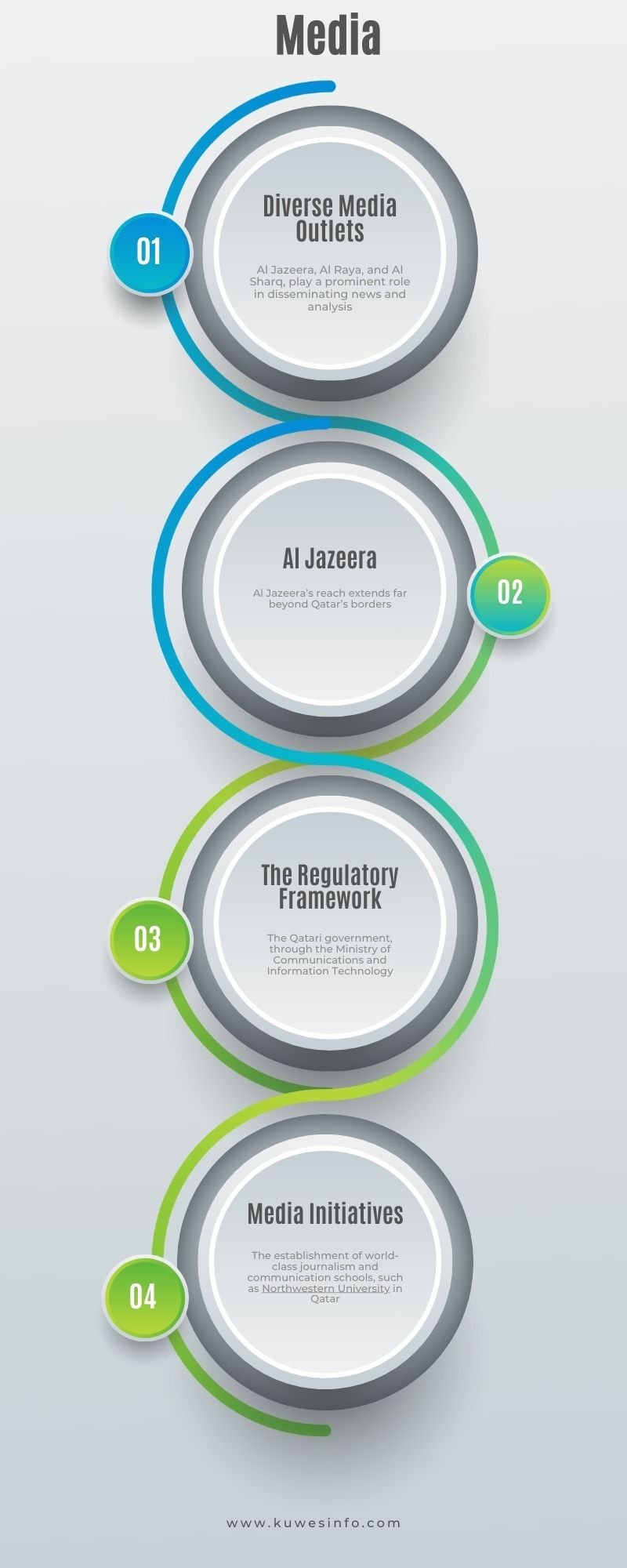
Diverse Media Outlets:
Qatar boasts a diverse range of media outlets that cater to its multicultural society. Arabic language newspapers, such as Al Jazeera, Al Raya, and Al Sharq, play a prominent role in disseminating news and analysis. English-language publications like The Peninsula and Gulf Times ensure that both local and expatriate communities are well-informed about current affairs.
Al Jazeera: A Global Media Giant:
Al Jazeera, launched in 1996, is perhaps the most well-known media entity to emerge from Qatar. It has earned international acclaim for its in-depth reporting and commitment to journalistic integrity. Al Jazeera’s reach extends far beyond Qatar’s borders, as it broadcasts in multiple languages, serving a global audience. Its reputation as a news source, particularly for Middle East coverage, remains unparalleled.
The Regulatory Framework:
The state of Qatar, recognizing the importance of a regulated yet free media environment, has enacted laws that ensure responsible journalism. The Qatari government, through the Ministry of Communications and Information Technology, oversees media regulation, safeguarding freedom of expression while maintaining media ethics.
Media Initiatives:
In recent years, Qatar has sought to position itself as a regional media education hub. The establishment of world-class journalism and communication schools, such as Northwestern University in Qatar and the Doha Center for Media Freedom, reflects the nation’s commitment to nurturing talent and fostering responsible journalism.
Geography and Location
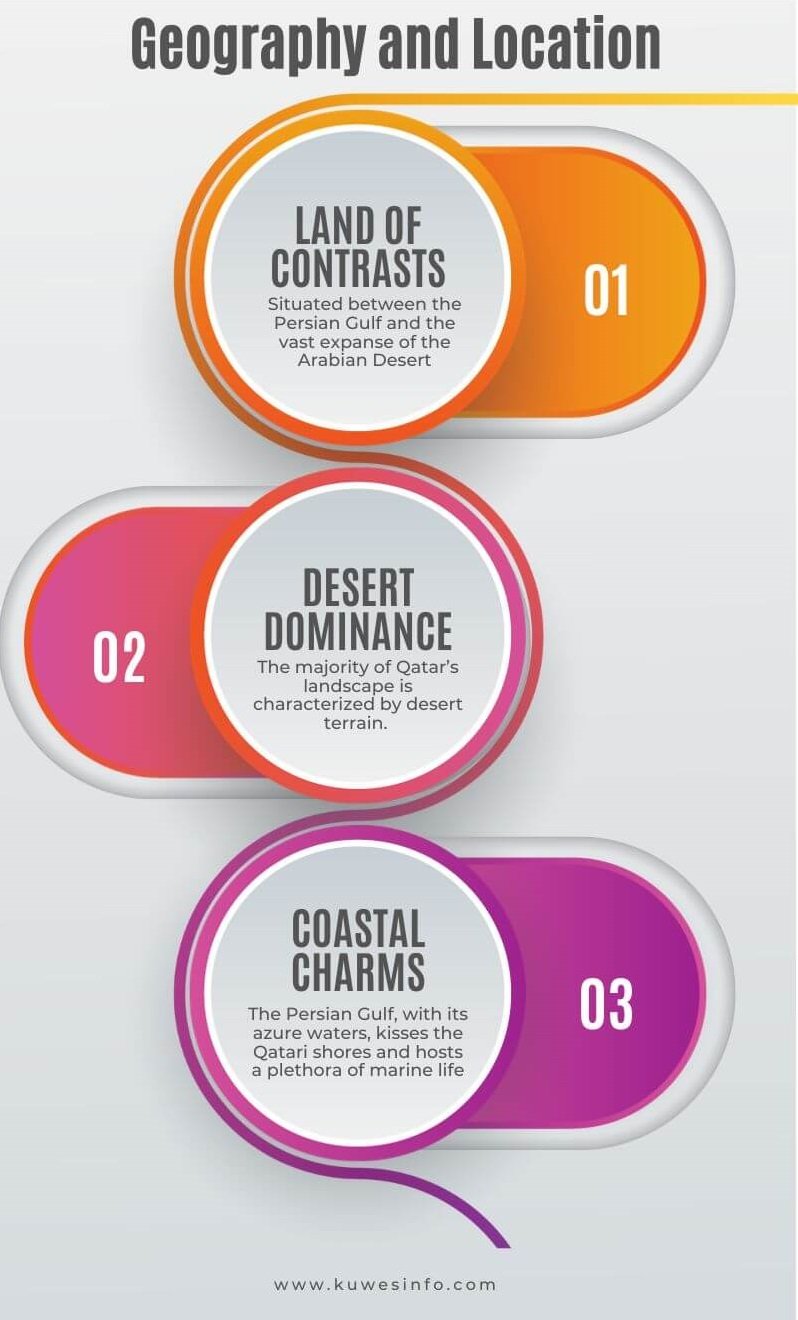
Nestled on the northeastern coast of the Arabian Peninsula, the State of Qatar is a remarkable country that boasts a unique blend of modernity and tradition. While it’s renowned for its opulent skyscrapers and thriving economy, Qatar’s geography and location are equally fascinating. This article takes you on a journey through the geographical features, biodiversity, and climate of this small but dynamic nation.
Land of Contrasts
Qatar’s geographical location presents a striking contrast between land and sea. Situated between the Persian Gulf and the vast expanse of the Arabian Desert, the country covers an area of approximately 11,586 square kilometers. Its shape, which juts out into the Gulf, resembles a thumb, and this distinctive geography is a significant contributor to its unique climate.
Desert Dominance
The majority of Qatar’s landscape is characterized by desert terrain. The undulating sand dunes, known as “seif dunes,” are a remarkable feature of the Qatari desert. These dunes often stretch across the horizon, creating a mesmerizing scene, especially during sunrise and sunset. The Rub’ al Khali, or the Empty Quarter, is the world’s largest continuous sand desert, and it extends into southern Qatar.
Coastal Charms
Despite its predominantly arid interior, Qatar’s coastline is a surprising delight. The Persian Gulf, with its azure waters, kisses the Qatari shores and hosts a plethora of marine life. Mangroves and coral reefs can be found along the coast, creating vital ecosystems for various species.
Biodiversity
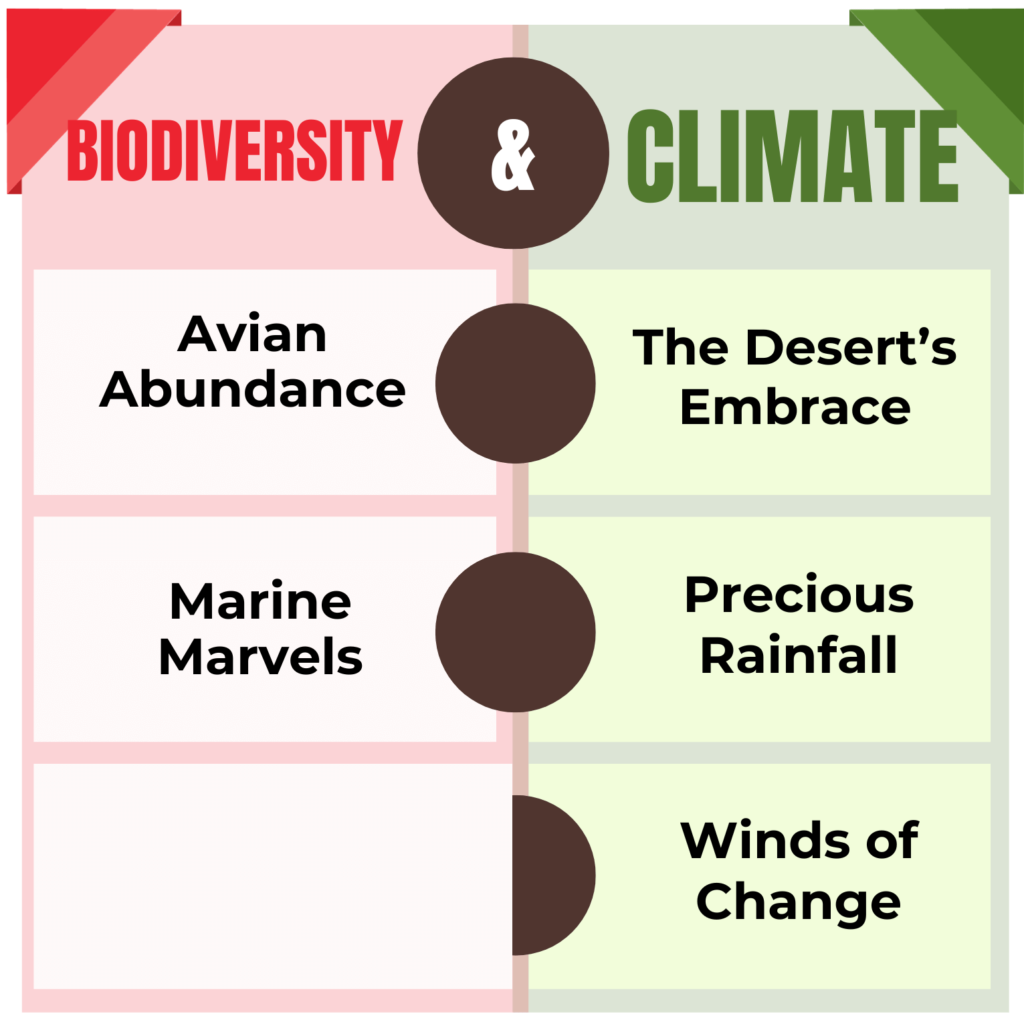
Avian Abundance
The country’s strategic location along the East African-West Asian flyway makes it a haven for birdwatchers. Qatar is a crucial stopover for migratory birds, and various species can be observed during their seasonal migrations. In addition to the migratory birds, Qatar is home to resident species like the Arabian babbler, desert lark, and hoopoe.
Marine Marvels
The coastal waters of Qatar harbor a diverse range of marine life, including coral reefs, sea turtles, and various species of fish. The government has also taken steps to protect and conserve these ecosystems to promote marine biodiversity and ensure sustainable fisheries.
Climate:
The Desert’s Embrace
Qatar experiences a hot desert climate, characterized by scorching summers and mild winters. The summer months, from May to September, are known for their extreme heat, with temperatures often exceeding 40°C (104°F). The winter season, on the other hand, brings more moderate temperatures, making it the preferred time for outdoor activities.
Precious Rainfall
Rainfall in Qatar is scarce, with the country receiving only minimal precipitation. Most of the rain occurs during the winter months and is often sporadic. The arid climate and limited water sources have prompted Qatar to implement various water conservation measures.
Winds of Change
The prevailing wind systems in Qatar play a vital role in its climate. The Shamal, a northwesterly wind, can bring sandstorms and dust clouds during the summer months. These winds are a natural part of life in Qatar and are a result of the country’s location near the desert.
Law:
Legal Foundations
Qatar’s legal system is based on a combination of Islamic law (Sharia) and civil law traditions. Sharia law forms the core of the country’s legal framework, affecting various aspects of personal status, family law, and inheritance. The country has made efforts to modernize and adapt its legal system, establishing the Qatar Financial Centre as a hub for international businesses and transactions.
Judicial Independence
The judicial system in Qatar is relatively independent, with a hierarchy of courts culminating in the Court of Cassation as the highest court of appeal. The judiciary plays a vital role in upholding the rule of law, and the country has taken steps to enhance transparency and efficiency within the legal system.
Regional Diplomacy
Qatar has emerged as a key player in regional and global politics, owing to its strategic location and assertive foreign policy. The nation has actively engaged in regional diplomatic efforts, mediating conflicts, and maintaining diplomatic relations with various countries, including those in the Middle East and beyond. Qatar’s influential role was particularly evident during the 2017 Gulf crisis, where it faced diplomatic isolation but stood its ground.
Economic Diversification
The country’s foreign relations are also closely linked to its economic interests. Qatar has invested in numerous projects and initiatives around the world, utilizing its vast natural gas resources and sovereign wealth fund to expand its global footprint.
Military:
Modernization and Defense
Qatar places a strong emphasis on its defense capabilities and military modernization. The Qatar Armed Forces are equipped with advanced weaponry and technology, and the country hosts U.S. military bases, further solidifying its security partnerships. Qatar’s military plays a crucial role in maintaining regional stability and security.
Human Rights:
Evolving Landscape
Qatar has made significant strides in promoting human rights and labor rights in recent years. It has implemented reforms in areas such as labor law, women’s rights, and the treatment of migrant workers. The nation has also taken steps to combat human trafficking and improve living conditions for laborers.
Challenges and Criticisms
Despite progress, challenges remain. Issues related to freedom of expression, political dissent, and LGBTQ+ rights have drawn international scrutiny. Qatar continues to address these concerns and make improvements, but there is room for further progress in safeguarding human rights.
Constitution:
Unwritten Constitution
Qatar does not have a formal, written constitution. Instead, the country’s system is guided by a combination of legal principles, Islamic law, and customary practices. The Qatari Constitution, as such, is based on various laws, decrees, and the country’s Islamic heritage.
Legal Framework
Qatar has established a comprehensive legal system, with a focus on ensuring justice and fairness. The judiciary, although not completely independent, works diligently to provide access to justice and maintain law and order. Qatar continues to invest in its legal infrastructure and has established specialized courts to handle various matters, including commercial disputes and labor issues.
Agriculture and Fishing:
Agriculture in Qatar faces inherent challenges due to its arid desert environment. The lack of arable land and limited fresh water resources have resulted in a heavy reliance on food imports. However, the government has implemented initiatives to promote local agriculture through advanced irrigation techniques and greenhouse farming. In terms of fishing, the country’s coastline on the Persian Gulf provides opportunities for the fishing industry, which contributes to both domestic consumption and exports.
Banking and Investment Hub
Qatar has emerged as a financial powerhouse in the region, with Doha serving as a financial center for the Gulf Cooperation Council (GCC). The Qatar Central Bank oversees the country’s banking system, and the Qatar Financial Centre attracts global financial institutions, offering various incentives and a business-friendly environment.
Trade & Services:
Global Connectivity
Qatar’s strategic location has made it a vital trading hub, bridging the gap between East and West. The country’s trade has expanded significantly, with exports primarily consisting of liquefied natural gas (LNG), petrochemicals, and various industrial products. Key trading partners include countries in Asia, Europe, and the United States.
Expanding Sector
The services sector in Qatar has grown exponentially, with an emphasis on diversification beyond oil and gas. This sector includes professional services, real estate, healthcare, and education. Qatar’s aspiration to become a knowledge-based economy has spurred investments in research and development, making it a hub for innovation.
Labour and Taxation:
Foreign Workforce
Qatar has a sizable expatriate workforce, contributing significantly to the country’s labor market. The Kafala system, which governs the sponsorship of foreign workers, has undergone reforms to improve labor conditions and rights. In terms of taxation, Qatar imposes no personal income tax on residents and a competitive corporate tax rate, making it attractive to foreign investors.
Technological Advancements
The telecommunications sector in Qatar is marked by advancements and high connectivity rates. Ooredoo and Vodafone Qatar are the primary service providers, offering mobile, internet, and cable TV services. The country’s investment in 5G technology and fiber-optic infrastructure has boosted its connectivity and accessibility.
Tourism:
Cultural and Sporting Attractions
Qatar has actively promoted tourism, offering cultural and sporting attractions. The country is home to stunning museums, iconic architecture, and hosts global sporting events such as the FIFA World Cup 2022. Tourism investments have driven the development of hotels, resorts, and entertainment facilities.
Energy:
The backbone of Qatar’s economy, the energy sector, is primarily centered on natural gas. Qatar is the world’s largest exporter of LNG, and the sector continues to be a major revenue generator for the nation. The country’s ambitious efforts to reduce emissions and increase energy efficiency have garnered global attention.
Transport:
Qatar’s strategic location has made it an international logistics and transportation hub. The Hamad International Airport, Hamad Port, and a well-developed road network facilitate the movement of goods and people. Qatar Airways, the national carrier, has become one of the world’s top airlines.
Qatar’s Vision for Education and Innovation
As the State of Qatar continues to make strides on the global stage, its focus on education and innovation stands out as a cornerstone of its development. In this article, we explore Qatar’s ambitious vision for education and the role of science and technology in driving its growth and transformation.
Education: A Key Pillar of Progress
Qatar’s dedication to education is evident through its robust investment in educational institutions, both at home and abroad. The country places a strong emphasis on providing its citizens with access to high-quality education and empowering the next generation of leaders.
Educational Excellence from Early Childhood
The country’s commitment to education extends to the early years, with initiatives to improve pre-school education and primary schooling. The Qatar Foundation’s initiatives emphasize the importance of a well-rounded, inquiry-based approach to learning.
Innovation: A Catalyst for Progress
Innovation is a driving force behind Qatar’s economic diversification and global competitiveness. The country has laid the groundwork for fostering innovation in various sectors, with science and technology taking center stage.
Science and Technology Parks
Qatar has established several science and technology parks, such as the Qatar Science & Technology Park (QSTP), dedicated to nurturing innovation and research. These hubs provide state-of-the-art infrastructure and a supportive environment for startups, entrepreneurs, and researchers.
Research and Development Investments
The country has invested heavily in research and development (R&D) across various sectors. The Qatar National Research Fund (QNRF) offers grants and funding opportunities to support innovative projects, with a focus on creating a knowledge-based economy.
Science and Technology: Catalysts for Progress
Qatar’s journey towards becoming a knowledge-based economy is intrinsically linked to advancements in science and technology.
Information and Communication Technology (ICT)
Qatar is making significant strides in the field of ICT. The country has invested in the development of a high-speed broadband network and 5G infrastructure. Initiatives like the Qatar Digital Government and Smart Qatar program aim to digitize government services, enhancing efficiency and accessibility.
Space Exploration
Qatar is taking its innovation to new heights with its national space program. The Qatar Space Agency (QSA) is actively engaging in satellite development, space research, and partnerships with global space organizations. The agency’s ambitious goals include putting a Qatari astronaut in space and advancing the country’s space capabilities.
Renewable Energy and Sustainability
Qatar is also investing in renewable energy and sustainability initiatives. The country aims to diversify its energy sources and reduce its carbon footprint, aligning with global efforts to combat climate change. Projects like the Qatar National Vision 2030 focus on sustainability, energy efficiency, and reducing environmental impact.
Future Prospects
Qatar’s commitment to education and innovation positions the country as a hub for knowledge, research, and forward-thinking solutions. As it continues to invest in world-class educational institutions, research endeavors, and technology advancements, Qatar’s progress in science and technology promises to shape a brighter, more sustainable future for the nation and contribute to global innovation efforts. With a vision that aims for excellence and innovation, Qatar is undoubtedly a rising star in the realms of science, technology, and education.
Society and Demographics of Qatar: A Kaleidoscope of Diversity
The State of Qatar, perched on the northeastern coast of the Arabian Peninsula, is not just a nation of stunning landscapes and thriving economics; it’s also a testament to the diversity of its society and demographics. In this article, we will delve into various aspects of Qatari society, covering security, health and welfare, soils, climate, and the rich tapestry of plant and animal life that flourish in this unique region.
Security: Safeguarding Stability
Qatar is renowned for its commitment to maintaining security and stability in the region. The country’s proactive approach to national security includes robust defense forces and partnerships with international allies. The United States’ presence in Qatar, with the Al Udeid Air Base, highlights the strategic importance of Qatar in maintaining regional security and stability. The nation’s effective security apparatus plays a crucial role in fostering a safe environment for its residents.
Health and Welfare: Prioritizing Well-being
The government of Qatar places great importance on the health and welfare of its population. The country has made significant investments in healthcare infrastructure, providing world-class medical facilities and services. The Hamad Medical Corporation is at the forefront of healthcare, offering a wide range of specialized services. Qatar’s emphasis on welfare extends to the well-being of its residents, including expatriate workers, through various labor reforms and initiatives.
Soils: A Tapestry of Diversity
Qatar’s soil diversity is reflective of its geographical features. The majority of the country is characterized by arid desert soils. The arid landscape is marked by sand dunes and limited fertile land. However, in the northern coastal areas, especially in the vicinity of Al Ruwais, there are patches of fertile soils suitable for agriculture. The country’s agricultural sector primarily relies on advanced irrigation techniques and soil improvement methods to cultivate crops.
Climate: A Tale of Extremes
Qatar’s climate is characterized by extremes. The country experiences a hot desert climate, with scorching summers and mild winters. During the summer months, temperatures often soar beyond 40°C (104°F), while winters bring more moderate temperatures. The arid climate and limited rainfall have necessitated water conservation measures and the development of desalination plants to meet the country’s water needs.
Plant and Animal Life: Adapting to Arid Lands
The flora and fauna of Qatar have adapted to the challenging desert environment. Plant life includes hardy species such as desert shrubs, acacia trees, and drought-resistant grasses. The mangroves along the coast provide vital ecosystems for various species, including the Avicennia marina, or the grey mangrove.
Language and Religion of Qatar
Qatar, a vibrant nation on the northeastern coast of the Arabian Peninsula, is a place where rich cultural tapestries are interwoven to create a unique societal blend. In this article, we explore two fundamental aspects of Qatari society: language and religion.
Language: Bridges Across Cultures
Qatar’s linguistic landscape is a testament to its diverse and cosmopolitan population. Arabic is the official language and is widely spoken in daily life and in all aspects of governance. The Qatari dialect of Arabic, closely related to the Gulf Arabic dialect, is the primary form of spoken Arabic in the country.
However, Qatar’s multicultural environment has led to the prevalence of many other languages, with English being the most common second language. It’s widely used in business, education, and as a lingua franca among the expatriate community. A multitude of languages, including Hindi, Urdu, Malayalam, Tagalog, and others, are also heard due to the country’s significant expatriate workforce. This linguistic diversity creates a mosaic of languages, fostering cross-cultural communication and understanding.
Religion: A Pillar of Identity
Islam is not only the predominant religion in Qatar but also a foundational element of the country’s identity and cultural heritage. The vast majority of Qatar’s citizens and residents adhere to Islam, and the nation follows the Sunni tradition of the faith. Mosques dot the landscape, and the call to prayer resonates throughout the day, marking the rhythm of Qatari life.
The practice of Islam is not limited to religious observance but extends to many facets of daily life, from the observance of religious festivals like Ramadan to the celebration of Islamic holidays. Qatar’s commitment to its Islamic heritage is exemplified by the presence of institutions like the Sheikh Faisal Bin Qassim Al Thani Museum, which showcases Islamic art, culture, and history.
The Intersection of Language and Religion
The intersection of language and religion in Qatar is a reflection of the nation’s openness to diversity. Arabic is the language of the Quran, and its significance in Islamic religious practice is profound. However, Qatar’s commitment to inclusivity and respect for various faiths is exemplified by its acceptance of diverse linguistic and religious communities.
Doha Cultural Festival: A Celebration of Art and Heritage
The Doha Cultural Festival is an annual extravaganza that showcases Qatar’s cultural heritage and artistic expressions. This vibrant event features a diverse range of activities, including traditional performances, music, dance, and art exhibitions. The festival provides a platform for local and international artists to display their talents and immerse visitors in the rich culture of Qatar.
Arts and Museums: A Glimpse into History and Creativity
Qatar is home to an array of world-class museums and galleries, each offering a unique perspective on the country’s culture. The Museum of Islamic Art, designed by I.M. Pei, is a stunning architectural masterpiece that houses a priceless collection of Islamic art spanning centuries. The National Museum of Qatar, shaped like a desert rose, narrates the story of Qatar’s evolution from its ancient past to the present.
Music: A Symphony of Sounds
The music scene in Qatar reflects its multicultural diversity. Traditional Qatari music, often accompanied by the oud, tabla, and rebaba, resonates with local and international audiences. Modern music genres are also celebrated, with Qatari musicians embracing various styles from around the world. The Qatar Philharmonic Orchestra, comprising both Qatari and international musicians, contributes to the country’s flourishing musical landscape.
Sport: A Thriving Passion
Sport is an integral part of Qatari culture, and the nation’s passion for athletics is palpable. Qatar hosts various international sporting events, most notably the FIFA World Cup 2022. Football, camel racing, and falconry are beloved traditional sports. Additionally, Qatar invests in the development of athletes and sports infrastructure, promoting a culture of health and well-being.
Landmarks and Attractions
Nestled on the northeastern coast of the Arabian Peninsula, Qatar is a nation brimming with captivating landmarks and attractions that tell the story of its rich history and contemporary dynamism. From architectural marvels to natural wonders, Qatar offers a kaleidoscope of experiences for travelers and residents alike. In this article, we will embark on a journey through some of Qatar’s most remarkable landmarks and attractions.
Museum of Islamic Art: Where Art Meets Architecture
The Museum of Islamic Art, designed by the renowned architect I.M. Pei, stands as a masterpiece of modern architecture on the shores of Doha Bay. Inside, it houses a priceless collection of Islamic art spanning over 14 centuries. The museum showcases exquisite artifacts, manuscripts, textiles, ceramics, and more. Beyond its invaluable treasures, the museum’s striking geometric design and captivating views of the Doha skyline are attractions in their own right.
National Museum of Qatar: The Desert Rose
The National Museum of Qatar, also known as the Desert Rose, is an architectural marvel designed by Jean Nouvel. Its unique, futuristic design pays homage to the country’s past, resembling the naturally occurring crystal formations found in the Qatari desert. Inside, it tells the story of Qatar’s evolution, from its ancient history to the present day, through a series of immersive exhibitions and interactive displays.
Katara Cultural Village: A Hub of Arts and Culture
The Katara Cultural Village is a vibrant epicenter of arts and culture in Doha. This bustling district offers a plethora of artistic and cultural events, from art galleries and exhibitions to musical performances and film festivals. The amphitheater, inspired by ancient Roman theaters, hosts a variety of live performances, making it a must-visit for anyone seeking a dose of cultural enrichment.
Souq Waqif: Where Tradition Comes Alive
Souq Waqif, a bustling market in the heart of Doha, is a living testament to Qatari tradition and heritage. Its winding alleys are lined with shops selling everything from spices and textiles to traditional garments and handicrafts. The souq’s vibrant atmosphere, with street performers and alfresco dining, makes it a popular spot for both locals and tourists.
The Pearl-Qatar: A Riviera-Style Island
The Pearl-Qatar, an artificial island off the coast of Doha, is a luxury destination known for its elegant marinas, upscale shopping, and Mediterranean-inspired architecture. With a Venetian vibe and an array of dining and entertainment options, it’s a place where visitors can unwind and enjoy a Riviera-style experience.
Zubarah Fort: A Glimpse into History
Zubarah Fort, a UNESCO World Heritage Site, stands as a reminder of Qatar’s rich history. This 18th-century fort was constructed to protect the country’s flourishing pearl diving and trade activities. Today, the restored fort offers a captivating journey back in time with its well-preserved artifacts and exhibits.
Al Wakra: A Historical Coastal Town
Al Wakra, a coastal town located south of Doha, is a captivating blend of tradition and modernity. It boasts a beautifully restored old souq, reflecting the town’s historical roots, and a pristine beachfront, offering a serene escape from the city’s hustle and bustle.
Inland Sea (Khor Al Adaid): A Natural Wonder
The Inland Sea, or Khor Al Adaid, is a unique natural wonder, where a striking desert landscape meets the tranquil waters of the Persian Gulf. This UNESCO-recognized site is a place of serene beauty, where visitors can enjoy dune bashing, camping, and water sports while taking in the breathtaking views of the surrounding desert and sea.
Dahl Al Hamam Park: A Green Oasis
Dahl Al Hamam Park, located in Al Duhail, is a picturesque green space offering respite from the urban bustle. This lush park features walking paths, play areas, and a serene lake, making it a perfect spot for picnics and outdoor activities.
Culinary Delights
Savoring the Flavors of Qatar: A Culinary Odyssey
Qatar, a vibrant nation on the northeastern coast of the Arabian Peninsula, is not only known for its towering skyscrapers and thriving economy but also for its culinary delights that offer a delectable journey through the country’s history, culture, and diverse influences. In this article, we embark on a gastronomic adventure, exploring the rich tapestry of flavors that make up Qatari cuisine.
A Blend of Tradition and Modernity
Qatari cuisine is a reflection of the nation’s multifaceted history and its role as a melting pot of cultures. With influences from the Arabian Peninsula, Persia, India, and beyond, Qatari dishes showcase a unique blend of flavors, spices, and cooking techniques.
Mouthwatering Mezze: The Art of Small Plates
Mezze, a selection of small, flavorful dishes, is a staple of Qatari dining. It’s often the first course of a traditional meal and includes a variety of appetizers such as hummus, falafel, baba ghanoush, and vine leaves stuffed with aromatic rice and herbs. Mezze offers an explosion of flavors and textures that awaken the palate.
Green Horizons: Qatar’s Commitment to Environmental Initiatives
Qatar, a nation known for its rapid economic growth and stunning modern architecture, is also turning its attention to the preservation of its natural environment. With a growing awareness of the importance of sustainability, Qatar has embarked on a series of environmental initiatives that aim to protect its unique ecosystems, conserve resources, and address global environmental challenges. In this article, we’ll explore some of the key environmental initiatives that Qatar has undertaken to secure a greener future.
Sustainable Development Goals: Qatar’s Vision for 2030
Central to Qatar’s environmental initiatives is its commitment to the United Nations’ Sustainable Development Goals (SDGs). Qatar’s National Vision 2030 serves as a guiding framework for achieving these goals. Within this vision, there’s a strong focus on the environment, with targets that include reducing greenhouse gas emissions, promoting sustainable transportation, and conserving the country’s rich biodiversity.
Renewable Energy Transition: Solar Power’s Ascent
Qatar is actively diversifying its energy portfolio, with a focus on harnessing renewable energy sources. The country’s abundant sunshine has made it an ideal location for solar energy projects. Qatar’s ambitious efforts include the development of solar farms and photovoltaic facilities. These initiatives aim to reduce the nation’s carbon footprint and promote cleaner energy solutions.
Green Transportation: From Fossil Fuels to Electric Wheels
In a region where automobiles are a way of life, Qatar is taking steps to transition to green transportation alternatives. The Qatar Mobility Innovations Center (QMIC) is driving research and development in sustainable transportation, including electric vehicles and improved public transportation systems. Initiatives to reduce traffic congestion and promote eco-friendly commuting options are part of Qatar’s drive toward sustainability.
Also Read: How To Get OEC-In Qatar
Wildlife Conservation: Safeguarding Biodiversity
Qatar’s unique ecosystems, including mangroves, salt flats, and desert landscapes, are home to a diverse range of flora and fauna. The nation is investing in biodiversity conservation, with programs that aim to protect endangered species and their habitats. Qatar’s efforts include initiatives to preserve coral reefs and protect the nesting sites of endangered hawksbill turtles.
Waste Management and Recycling: A Cleaner Future
Efforts to manage waste and promote recycling have gained momentum in Qatar. The country is establishing state-of-the-art waste management facilities and increasing recycling rates. Qatar has also banned the dumping of untreated sewage into the sea, signaling its commitment to protecting marine environments.
Climate Action: Preparing for a Changing World
Qatar is taking active measures to address climate change and its impacts. The country has implemented strategies to reduce emissions, adapt to changing climate conditions, and promote sustainable water management practices. These actions align with international agreements, signaling Qatar’s commitment to addressing global environmental challenges.
Environmental Education: Nurturing Sustainability
Promoting environmental awareness and education is a key component of Qatar’s environmental initiatives. The country has undertaken efforts to educate its population on the importance of sustainability and conservation. Environmental workshops, educational programs, and public awareness campaigns play a vital role in shaping a culture of responsible environmental stewardship.
Sustainable Landscaping and Urban Planning: A Greener Tomorrow
Qatar’s commitment to sustainability extends to urban development. The country is promoting green building practices, which include the use of sustainable materials, energy-efficient designs, and rooftop gardens. Green spaces within cities, parks, and landscaping initiatives are all part of the country’s vision for a more sustainable urban environment.
Challenges and Future Prospects
Qatar, a nation that has rapidly transformed itself over the past few decades, is no stranger to challenges. With its booming economy, impressive skyline, and ambitious initiatives, the nation has achieved remarkable growth. However, it is not immune to the hurdles that come with progress. In this article, we delve into the challenges that Qatar faces and the promising prospects that lie ahead.
Challenges Faced by Qatar:
- Diversifying the Economy:
Qatar’s economy has long been dependent on hydrocarbon resources. Although the nation has made strides in diversification, there’s an ongoing need to reduce its reliance on fossil fuels and foster a more sustainable, knowledge-based economy.
- Climate Change and Water Scarcity:
Qatar’s arid desert climate makes it particularly vulnerable to climate change and water scarcity. Rising temperatures, extreme weather events, and the over-extraction of groundwater pose significant environmental challenges.
- Labor and Human Rights:
The treatment of foreign workers, who make up a substantial portion of Qatar’s population, has garnered international attention. Addressing labor rights and working conditions remains a priority.
- Geopolitical Tensions:
Qatar’s geopolitical situation in the Gulf region has created complexities in diplomatic relations, which have, at times, led to political disputes with neighboring countries.
Future Prospects for Qatar:
- Economic Diversification:
Qatar’s commitment to economic diversification is expected to yield positive results. The nation’s initiatives in finance, technology, research, and development will foster a more balanced and sustainable economy.
- Environmental Sustainability:
Qatar’s focus on sustainability is evident in its investments in renewable energy, waste management, and the protection of its unique ecosystems. These efforts position the country as a leader in environmental conservation.
- Geopolitical Diplomacy:
Qatar’s diplomatic initiatives and active role in international organizations present opportunities for the nation to strengthen relationships and resolve regional issues.
- Cultural Enrichment:
Qatar’s focus on preserving its cultural heritage and promoting the arts offers prospects for a vibrant, dynamic cultural scene that can continue to thrive.
Travel Tips and Practical Information
Qatar is a nation that combines the mystique of the desert with the modernity of a burgeoning metropolis. Whether you’re planning a visit for business or leisure, this article provides a handy guide filled with travel tips and practical information to ensure your journey to Qatar is a memorable one.
Visa and Entry Requirements:
Before traveling to Qatar, it’s essential to check the visa and entry requirements for your nationality. Qatar offers various types of visas, including tourist, business, and transit visas. It’s advisable to apply for a visa well in advance through the Qatar Visa Portal or through a local sponsor in Qatar.
Best Time to Visit:
The best time to visit Qatar largely depends on your preferences. The winter months, from November to April, offer pleasant weather with cooler temperatures, making it ideal for outdoor activities and sightseeing. The summer months, from May to October, can be scorching, with high temperatures and humidity. However, this is also when many of Qatar’s indoor attractions are bustling, and you may find good deals on accommodations.
Getting Around:
Taxi: Taxis are a convenient mode of transportation in Qatar. Karwa taxis are readily available and can be hailed on the street or booked through ride-hailing apps.
Rental Cars: Renting a car is a practical option if you plan to explore beyond Doha. International and local car rental companies offer a range of vehicles to suit your needs.
Public Transportation: Qatar’s public transportation system includes buses, the Doha Metro, and the Lusail Light Rail Transit. The Doha Metro, in particular, is a convenient way to travel within the city.
Currency and Payments:
The currency in Qatar is the Qatari Riyal (QAR). Credit and debit cards are widely accepted in major establishments, but it’s advisable to carry some cash for smaller vendors and local markets.
Cultural Etiquette:
Dress modestly, especially in public places and religious sites. Women are encouraged to cover their shoulders and knees.
Public displays of affection are generally discouraged.
During Ramadan, eating, drinking, and smoking in public places are prohibited during daylight hours.
Local Cuisine:
Qatari cuisine is a delightful fusion of flavors influenced by Middle Eastern, Indian, and Mediterranean culinary traditions. Don’t miss trying local dishes such as Machboos (spiced rice with meat), Harees (wheat porridge with meat), and Luqaimat (sweet dumplings). While alcoholic beverages are available in hotels, they are not widely consumed in public.
Safety and Health:
Qatar is known for its safety, and crime rates are relatively low. However, it’s essential to take standard precautions, such as safeguarding your belongings and avoiding isolated areas after dark.
Qatar has a high-quality healthcare system with modern medical facilities. It’s advisable to have travel insurance to cover any unexpected medical expenses.
Language:
Arabic is the official language in Qatar, but English is widely spoken, especially in business and tourism. Signs and menus are often bilingual.
Electrical Outlets:
Qatar uses the British-style Type G electrical outlet. It’s advisable to bring the appropriate power adapters or converters if your devices have different plug types.
Time Zone:
Qatar Standard Time (AST) is UTC+3. The country does not observe daylight saving time.
Concluding Thoughts: Qatar Endless Horizons
As we close this chapter on Qatar, we are reminded that the story of this nation is far from over. Its horizons are endless, and its journey continues to unfold. Whether you’re planning a visit to this enchanting land or simply seeking to understand its allure from afar, Qatar invites you to be a part of its evolving narrative.
In Qatar, the adventure never ends, and the opportunities are infinite. This is a nation that welcomes you to explore, discover, and become a part of its tapestry. It’s a place where the past is honored, the present is vibrant, and the future is filled with boundless promise. In Qatar, the world is at your feet, and the possibilities are limitless.


